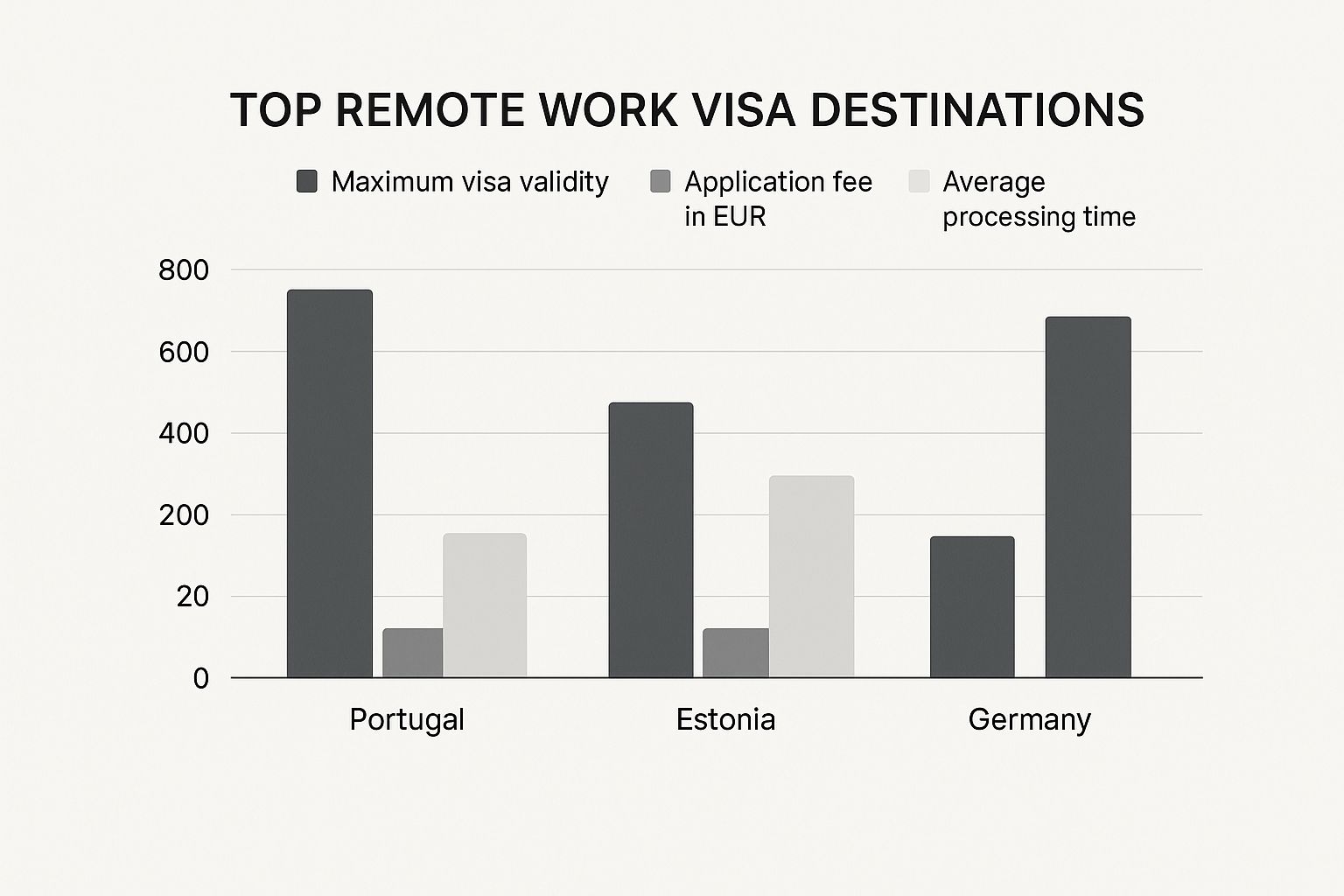Your Guide to the Remote Work Visa Europe

The dream of working from a laptop while soaking up European culture isn't just a fantasy anymore. It's a real, achievable goal thanks to a specific type of permit: the remote work visa. Often called a digital nomad visa, it's your official key to living long-term in a European country while you earn a living from clients or an employer back home.
The New Era of Working Remotely in Europe

The global shift to remote work completely changed our concept of the "office." What started as a temporary fix for many has blossomed into a full-blown lifestyle. Just look at the numbers: in 2023, a staggering 17.3 million Americans called themselves digital nomads, a huge leap from the years before the pandemic.
This isn't just a trend; it's a massive cultural shift, and European countries have been paying close attention.
Realizing they can attract talented, high-earning professionals, nations across the continent have started rolling out these specialized visas. They're tailor-made for people like you and me—professionals who aren't tied to a physical desk. Think of it as a middle ground, a perfect bridge between a short-term tourist visa and a complicated residency permit that ties you to a local employer.
Why Is Europe a Top Destination?
It's no secret that Europe holds a special appeal. The chance to immerse yourself in dozens of different cultures, languages, and food scenes—all just a short train ride apart—is incredibly compelling. For many, it's about chasing a better quality of life, where professional goals don't have to overshadow personal adventures.
The core idea behind a remote work visa is simple: live like a local, but work like a global citizen. It’s an official invitation to integrate into a new society without being tied to its local job market.
Consider this guide your personal roadmap. I'll walk you through everything, from understanding the basic requirements to confidently hitting "submit" on your application. The goal here is to give you the practical knowledge you need to make that dream of working from a cafe in Lisbon or a coworking space in Berlin your new reality.
In this comprehensive guide, you'll discover:
- The fundamentals of how a remote work visa operates.
- Detailed comparisons of top visa programs in countries like Spain, Portugal, and Germany.
- Step-by-step instructions for preparing and submitting your application.
- Answers to common questions about taxes, family, and potential challenges.
So, How Do These Remote Work Visas Actually Work?
Let's cut through the jargon. What really is a "remote work visa" for Europe? It's not your typical work permit that ties you down to a local employer. The best way to think of it is as a special kind of long-stay visa that lets you live in a country while earning your money from somewhere else entirely.
This is a pretty clever setup for everyone involved. The host country gets a new resident who spends money on rent, groceries, and local cafes—boosting the economy without taking a job away from a local. And you? You get the incredible opportunity to immerse yourself in a new culture without the stress of navigating a foreign job market. It's the key to blending your career with a life of travel and exploration.
But before they hand over that key, European governments need to know you can stand on your own two feet. They’re looking for responsible, self-sufficient people who won't become a drain on their public services. That's why every single digital nomad visa application rests on a few fundamental pillars.
The Four Pillars of a Strong Application
While the details might change whether you're looking at Portugal or Croatia, almost every European remote work visa is built on the same four core requirements. Getting these right is the foundation of a successful application. Think of it as a checklist to prove you're exactly the kind of person they want to welcome.
- Proof of Remote Work: You have to show that your job isn't tied to a specific location.
- Sufficient and Stable Income: You need to prove you earn enough money from non-local sources.
- Comprehensive Health Insurance: You must have your own private health coverage.
- A Clean Criminal Record: A background check is always part of the deal.
Nail these four elements, and you’ll be in a fantastic position, no matter which country you have your heart set on. Let’s dig into what each one really means in practice.
Proving Your Livelihood is Remote
First things first: you absolutely must prove your income originates outside the country you're moving to. This is the whole point of a digital nomad visa. You're not there to find a job; you're bringing your job with you.
So, if you're a freelance writer, this means showing active contracts with clients in your home country or anywhere else in the world—just not in, say, Spain if that's where you're applying. If you're a full-time employee, you'll need an official letter from your company that explicitly gives you permission to work remotely from abroad.
The critical piece of the puzzle here is the source of the income. Consular officers are trained to look for a clear, undeniable link between the money hitting your bank account and a foreign company or international clients. This is their assurance that you won't be competing in the local job market.
Hitting the Minimum Income Target
Every country has a specific income threshold you need to meet. This number isn’t just pulled out of thin air; it’s usually calculated based on the local cost of living or pegged to the national minimum wage. Portugal, for example, requires you to earn four times its national minimum wage, which currently works out to about €3,280 per month.
You’ll have to back this up with solid paperwork. Be prepared to gather documents like:
- Bank Statements: Usually the last six months to demonstrate a consistent, stable flow of income.
- Employment Contracts: An official document that clearly states your salary.
- Client Invoices: For freelancers, you'll need to show a record of recent work and payments.
- Tax Returns: Your most recent filings from your home country give them the big picture of your financial health.
This financial screening gives the government confidence that you'll be a net positive for their economy—someone who spends money at local businesses, not someone who might need public assistance.
Comparing The Top European Remote Work Visas
This is the fun part—choosing where in Europe you want to set up your remote work life. It's a huge decision, and with so many countries rolling out the welcome mat for digital nomads, you have some incredible options. Each country's visa comes with its own flavor and set of rules.
Think of it like picking a home base for a grand adventure. You need to make sure the financial requirements, lifestyle, and your own career goals all line up. Let's dive into the details of the most popular programs to see which one is the right fit for you.
Portugal: The Popular Choice
Portugal’s D8 visa has become a massive hit in the remote work world, and it’s easy to see why. The country offers an amazing quality of life, a relatively low cost of living, and a visa process that isn't designed to make you pull your hair out.
To qualify, you'll need to prove a monthly income of at least €3,280. Once you have your visa and residence permit in hand, you get visa-free travel throughout the 27 countries in the Schengen Area. This makes Portugal a perfect launchpad for exploring the rest of the continent. Many people come for a year and end up staying much longer. For those with an eye on the future, you might find our guide on the best places to retire in Europe useful, as many of the same perks apply.
Spain: The Long-Term Play
If you’re dreaming of more than just a temporary stay, Spain's digital nomad visa is built for you. It's designed with long-term stability in mind, offering an initial one-year visa that you can renew for up to five years.
The income requirement is set at 200% of the Spanish minimum wage, which works out to about €2,646 per month. The real standout feature here is the path to permanent residency. After five years of living legally in Spain, you can apply to stay for good. This makes it an incredible option if you truly want to put down roots, learn the language, and make Spain your home.
Germany: For Business-Minded Freelancers
Germany’s visa for freelancers is a solid option if your work can directly benefit the German economy. The process can be a bit more intense, with more paperwork involved, but the payoff is access to one of Europe's strongest economies. Cities like Berlin and Munich are international hubs with fantastic infrastructure.
Unlike other countries, Germany doesn't have a single, fixed income number you have to meet. Instead, you have to prove you have enough money to support yourself and your business. The key difference is that you often need to show you already have German clients or strong business ties, proving your work has a local connection.
This chart gives you a quick visual breakdown of the key differences in visa length, fees, and wait times for these top three countries.

As you can see, each country offers a different balance of speed, cost, and duration, helping you find the one that best fits your timeline and budget.
Comparison of Top European Remote Work Visas
To make things even clearer, here’s a quick side-by-side comparison of the top programs. Use this table as a cheat sheet to weigh your options based on the factors that matter most.
| Country | Minimum Monthly Income | Visa Duration | Schengen Access | Key Feature |
|---|---|---|---|---|
| Portugal | €3,280 | 1 Year (Renewable) | Yes | Clear path to residency and a massive expat community. |
| Spain | €2,646 | 1 Year (Renewable up to 5) | Yes | Great long-term prospects, with a path to permanent residency. |
| Germany | Varies (Proof of funds) | Up to 3 Years | Yes | Strong economy, ideal for freelancers with German clients. |
| Croatia | €2,539 | 1 Year (Non-renewable) | Yes | Low cost of living on the beautiful Adriatic coast. |
| Estonia | €4,500 | 1 Year | Yes | A fully digital nation with a super-efficient online application. |
| Italy | €2,333 (approx. €28,000/year) | 1 Year (Renewable) | Yes | Geared toward "highly skilled" workers with specific qualifications. |
This at-a-glance view helps cut through the noise, highlighting the core requirements and unique benefits of each country's offer.
Other Great European Destinations
While the big names get a lot of attention, several other countries have fantastic remote work visas that might be perfect for you.
-
Croatia: With its stunning coastline and very affordable cost of living, Croatia is perfect for a year-long European adventure. The income requirement is reasonable at around €2,539 per month. Just be aware that the visa is non-renewable; you have to leave for six months before you can apply again.
-
Estonia: A true digital pioneer, Estonia offers a visa process that is as modern and efficient as the country itself. The income threshold is higher at €4,500 per month, but the online application is famously straightforward.
-
Italy: The brand-new Italian visa is aimed at "highly skilled" professionals. You'll need an annual income of at least €28,000 and proof of higher education or professional credentials to qualify.
Ultimately, the best remote work visa Europe has to offer is the one that clicks with your personal and professional goals. By comparing these key details, you can confidently pick the destination that will turn your dream of working from Europe into a reality.
Why Portugal Is a Top Hub for Digital Nomads

When you look at all the remote work visas popping up across Europe, Portugal consistently stands out from the crowd. Its D8 Digital Nomad Visa isn't just popular because it's easy to get; it’s a golden ticket to a lifestyle that perfectly blends work, adventure, and rich culture.
Portugal has really nailed what remote professionals are looking for. They’ve put together a package that’s about more than just legal paperwork—it’s an open invitation to enjoy a fantastic quality of life without the sky-high costs you’ll find in other Western European countries. This sweet spot of affordability and appeal makes it a real magnet for talent from all over the world.
The Financial Requirements Explained
Portugal’s income requirement is refreshingly practical. Instead of pulling a random number out of thin air, they’ve tied it directly to their own national minimum wage. It's a smart policy that ensures you can live comfortably and contribute to the local economy without needing a massive salary.
The visa, which kicked off in October 2022, has been a huge hit. To get your foot in the door, you need to prove a monthly income of at least €3,480. That figure is exactly four times Portugal's current minimum wage.
This visa lets you stay for a year initially, but here’s the best part: you can renew it for up to five years, which opens up a clear path to long-term residency. Plus, you get visa-free travel throughout the entire Schengen Area, making it the perfect home base for exploring Europe.
More Than Just a Visa
The D8 visa might be what gets you there, but it’s everything else that makes you want to stay. Portugal’s true charm lies in a unique mix of factors that create the perfect setup for a remote worker.
Portugal's true advantage lies in its holistic offering. It combines a practical visa process with an unbeatable lifestyle, making it one of the most compelling destinations for anyone seeking a European remote work base.
First off, the country is incredibly welcoming to foreigners. You'll find thriving digital nomad communities in cities like Lisbon and Porto, which makes it so much easier to connect with people and settle in. If you're weighing your options, our guide on the https://residaro.com/blog/best-cities-for-digital-nomads can point you in the right direction.
Then there’s the cost of living, which is still one of the lowest in Western Europe. Your money just goes further here, whether you're buying fresh produce at the market, hopping on public transport, or renting an apartment.
And finally, you have the lifestyle. Picture this: you wrap up your work for the day and can choose between hitting a sunny beach, wandering through historic cobblestone streets, or just relaxing at a cafe. With over 300 days of sunshine a year in some parts of the country, the weather alone is a massive perk. It all adds up to a pretty compelling case for making Portugal your next move.
How Spain Offers a Path to Long-Term Residency
While some remote work visas in Europe feel like a pass for a year-long adventure, Spain’s program is built on a different foundation. It’s designed for digital nomads who are thinking bigger, offering a clear and structured pathway toward making the country a genuine long-term home. This focus on stability really sets it apart from many of its neighbors.
Instead of just a temporary stamp in your passport, think of Spain's visa as the first chapter in a much longer story. The initial visa is valid for one year, but its real power is in the renewal. You can extend your stay for up to five years, transforming what started as a short-term move into a stable, semi-permanent base of operations.
This long-term vision makes Spain an excellent choice for remote professionals who want to truly put down roots. It gives you the security to actually learn the language, build local connections, and feel like you're part of the community, not just a visitor passing through.
Building a Life, Not Just a Stay
The Spanish government clearly thought this through, designing its visa to attract professionals who want to contribute. A key part of this is granting visa holders access to public services—a huge benefit that isn't always a given with other European remote work permits.
Spain's Digital Nomad Visa is easily one of the continent's most robust remote work permits. It allows for stays of up to five years and gives you access to public services, making it a seriously appealing choice for professionals relocating for the long haul. The program is designed to welcome a wide range of digital professionals, encouraging them to integrate into everything from bustling cities to quiet coastal towns.
This access to public services makes a world of difference. It creates a sense of belonging and makes the practicalities of daily life much smoother. It’s a clear signal that Spain is investing in its new residents, not just temporarily hosting them.
From Temporary Resident to Permanent Possibility
The most compelling part of Spain's program is what happens after those first five years. Once you’ve maintained legal residency for five consecutive years, you become eligible to apply for permanent residency. This is the endgame for so many people who fall in love with the Spanish lifestyle and decide they never want to leave.
Spain's remote work visa is more than a permit; it's a bridge to a new life. The five-year renewal track and potential for permanent residency offer a level of security that allows you to plan your future with confidence.
This long-term perspective is woven right into the visa's fabric. It’s perfect for:
- Families looking for stability for their kids.
- Entrepreneurs who want to establish a solid European base.
- Professionals who are serious about finding a better work-life balance for good.
The possibility of permanent residency changes the entire dynamic. It transforms the move from a temporary work gig into a potential life-changing decision. For anyone dreaming of putting down roots, our guide on how to retire in Spain offers more insight into the country's long-term appeal. This makes the remote work visa Europe offers in Spain a truly strategic choice for building a lasting future.
How to Nail Your Visa Application: A Step-by-Step Guide

Applying for a remote work visa in Europe can feel like you're training for a marathon. It looks intimidating from the starting line, but if you break it down into manageable steps, you'll cross the finish line without a problem. The golden rule? Start early. I always tell people to begin gathering documents 6 to 9 months before they even think about packing their bags.
Think of your application as a complete professional portfolio. Each document is a piece of the puzzle that proves you're a reliable, financially stable person who will be a great temporary resident. Your goal is to hand them a file so organized and complete that they have zero questions left to ask.
Your Essential Document Checklist
Let's start with the absolute must-haves. No matter which country's visa you're chasing, you're going to need these core documents. This is the foundation of your entire application.
-
Valid Passport: This one’s a no-brainer, but check the details. It needs to be valid for at least six months after your intended stay ends and have plenty of blank pages for that precious visa stamp.
-
Proof of Remote Work: This is the heart of your application. You’ll need a formal letter from your employer confirming they’re cool with you working abroad. If you're a freelancer, get ready to show your contracts with clients—all of whom must be based outside your destination country.
-
Proof of Financial Stability: Embassies need to know you can support yourself. You'll have to provide bank statements from the last six months, recent pay stubs, and tax returns to prove you meet their income requirements. Consistency is key here.
-
Letter of Intent: Don't underestimate this! This is your personal statement. It's where you clearly explain who you are, what you do for work, and—most importantly—why you're so excited about the prospect of living in their country.
These four items are your starting point. Now, let’s talk about a few of the trickier requirements that often catch people off guard.
Getting Past the Common Sticking Points
Beyond the basics, there are a few items that require extra attention. Honestly, getting these right can be the make-or-break factor for your application.
First up is international health insurance. Your plan from back home won't work. You need a specific policy that covers you fully in your new country for the entire visa period. Most countries require a minimum coverage of around €30,000. Companies like Cigna Global or AXA are go-to options for expats.
The number one reason I see for digital nomad visa rejections is having the wrong insurance. Don't just buy a cheap travel policy. You need a comprehensive international health plan that ticks every single box on the consulate's list.
Next on the list is a clean criminal background check. You'll have to get an official report from a national law enforcement agency, like the FBI in the US. This isn't something you can get overnight; the process can take weeks, so request it as soon as you decide to apply.
Finally, there’s proof of accommodation, which can be a real headache. A short-term Airbnb booking won’t cut it. Most consulates want to see a signed, long-term lease agreement. It's a classic chicken-and-egg problem, but sites like Spotahome or Idealista are great for finding rentals you can secure from abroad.
Getting these details right from the start will make the whole process feel less like a bureaucratic nightmare and more like the exciting first step toward your new life in Europe.
Your Remote Work Visa Questions Answered
Sorting through the fine print of a remote work visa in Europe can feel a bit overwhelming. The questions start piling up fast, especially when you think beyond your own application. What about my family? How do taxes work? And the big one: what if I get rejected?
Let's walk through some of the most common questions that pop up when you're planning this big move. Getting these answers straight will help you prepare for what’s ahead.
Can I Bring My Family With Me?
This is a big one, and thankfully, the answer is usually yes. Many European countries offering digital nomad visas understand that you might not be coming alone. They've built in provisions for dependents, like your spouse or children, because they want to attract professionals who are looking to plant some roots, even if it's just for a year or two.
It’s not automatic, though. You’ll need to prove you can financially support everyone. For example, if a country sets the income bar at €2,500 per month for a single applicant, you can expect to add another 20-50% for each family member you bring along. You'll also need extra paperwork, like marriage and birth certificates, which will probably need to be officially translated and authenticated. So, plan ahead for that extra layer of admin.
How Will My Taxes Work in Europe?
Welcome to the most complicated part of working abroad. There's no single answer here, as your tax situation will depend entirely on where you land and if your home country has a double-taxation treaty with your new one.
A good guideline to keep in mind is the 183-day rule. If you spend more than 183 days in a single year in a country, you're almost always considered a tax resident there. That means you could owe local taxes on your worldwide income.
Some countries sweeten the deal. Spain, for instance, has a special tax regime that offers a much lower rate for digital nomads in their first few years. Because this can get messy and have serious financial implications, my best advice is this: talk to a tax advisor who knows the ins and outs of expat tax law before you make the move. It's an investment that pays for itself.
What Happens If My Application Is Rejected?
Getting a rejection notice is a gut punch, but it doesn't have to be the end of the story. If your application is denied, the consulate will send you a formal letter explaining why. It's usually for a solvable reason.
Common culprits include:
- Proof of income that wasn't clear or consistent enough.
- Missing documents or simple mistakes on the forms.
- Health insurance that didn't meet their specific requirements.
Most countries have an official appeals process. This gives you a chance to fix the problems they pointed out and reapply. The key is to read that rejection letter carefully—it’s your roadmap to getting it right the second time around.
Ready to find the perfect home base for your European remote work adventure? At Residaro, we specialize in connecting people with their dream properties across Spain, Portugal, Italy, and more. Explore our extensive listings and start your journey today at https://residaro.com.